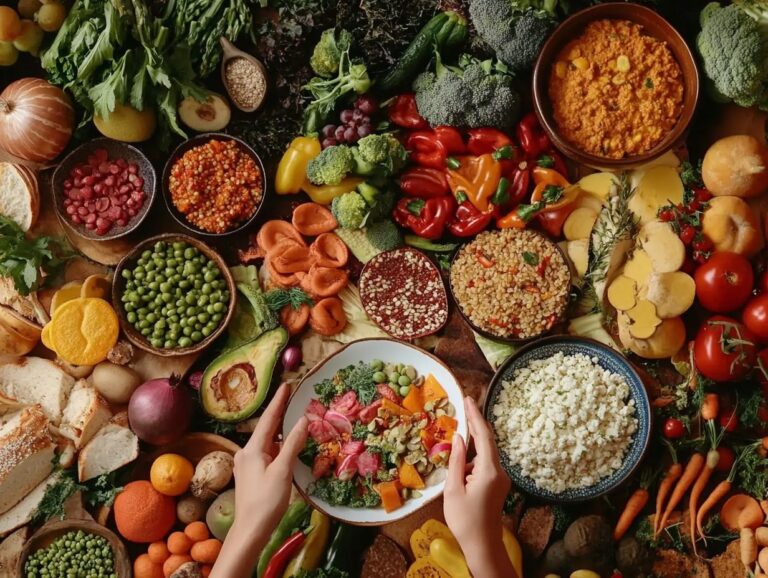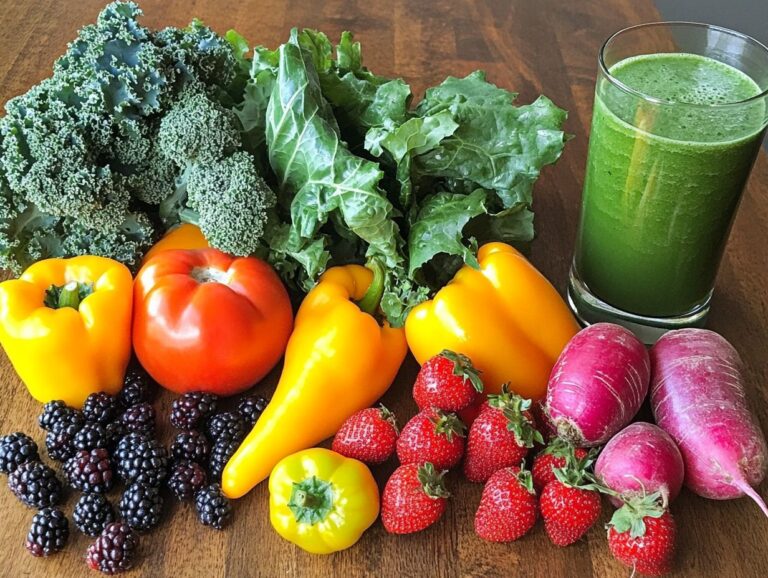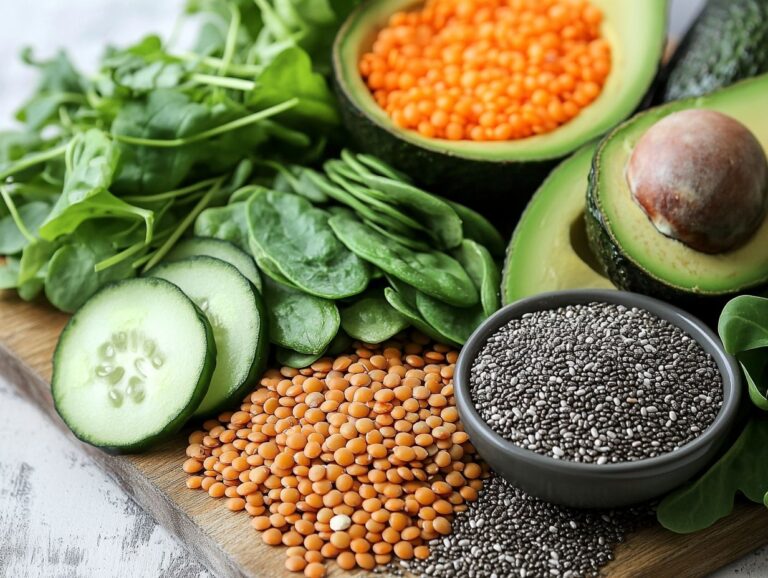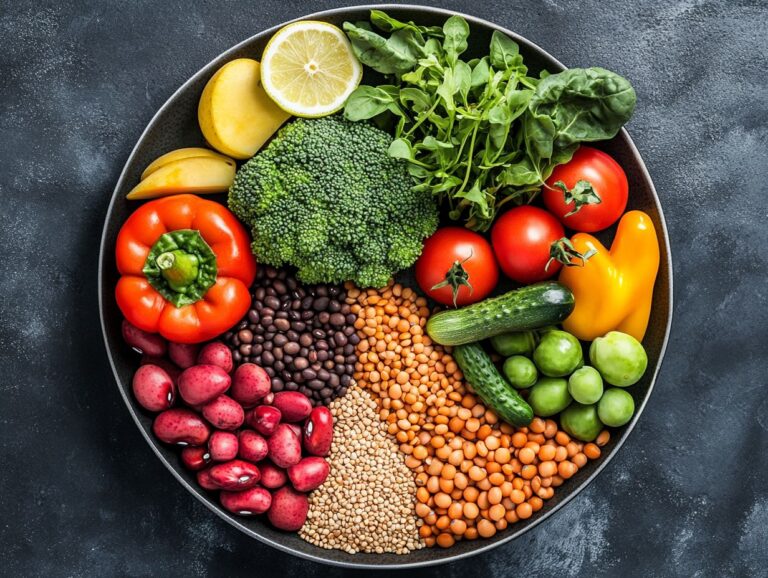Inflammation is a natural response of the body; however, when it becomes chronic, it can lead to various health issues. The foods we consume significantly influence the inflammation process, and adopting a vegan diet can be one of the most effective ways to manage inflammation. This article explores the connection between diet and inflammation, examines the pros and cons of a vegan lifestyle, and highlights the best foods to include or avoid for optimal health. Additionally, it explains how incorporating plant-based nutrition can help alleviate and heal the symptoms of inflammation in daily life.
Key Takeaways:
- Inflammation can be reduced through a vegan diet, which focuses on plant-based whole foods and avoids processed and animal products. This approach to inflammation management emphasizes anti-inflammatory and nutrient-rich foods.
- Fruits, vegetables, whole grains, legumes, nuts, and healthy fats are essential for a vegan diet for inflammation and provide important anti-inflammatory nutrients, such as fiber and phytochemicals.
- Avoiding processed foods, refined grains, added sugars, saturated and trans fats, and animal products can help reduce inflammation and promote overall health on a vegan diet.
What Is Inflammation?
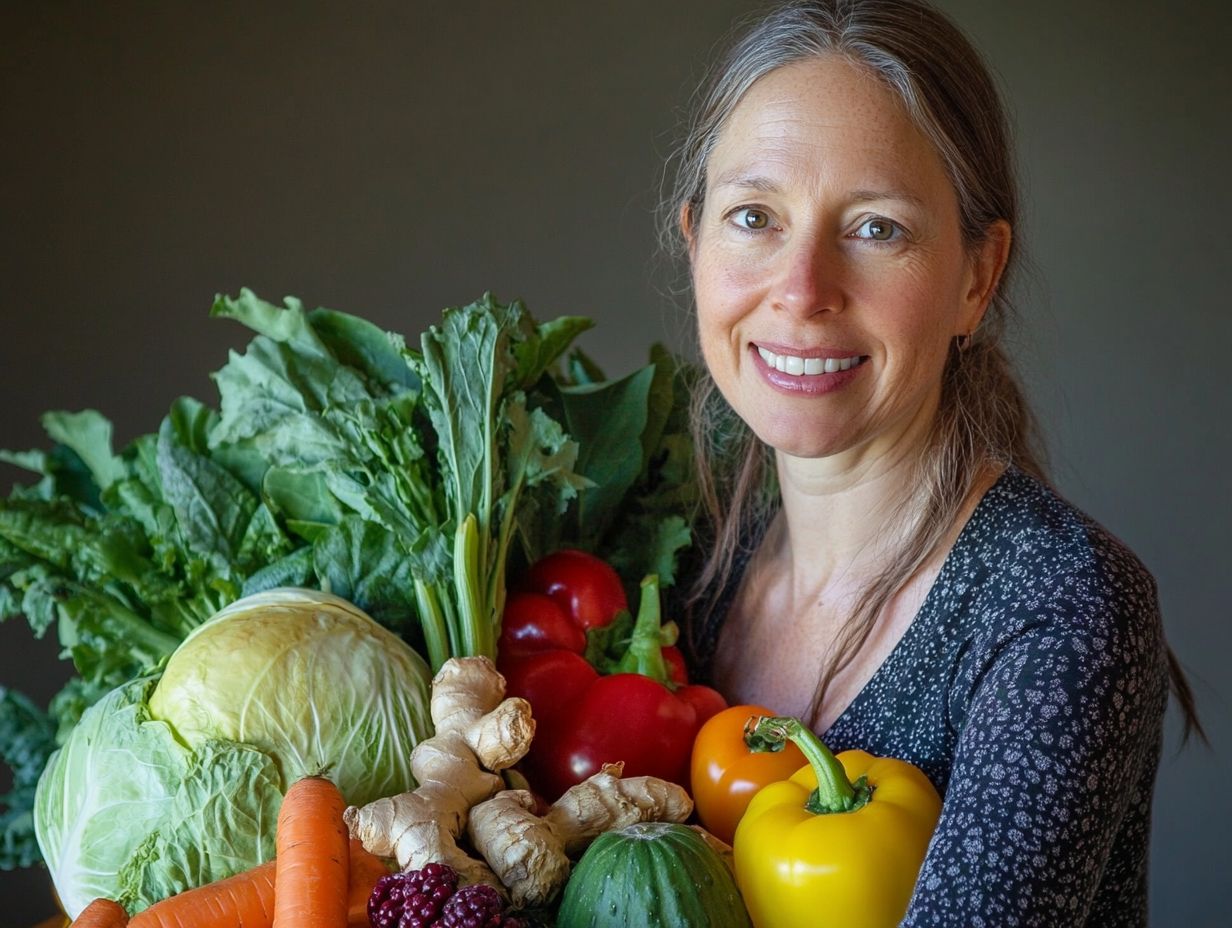
Inflammation is a complex biological response of the body’s immune system to harmful stimuli, including pathogens, damaged cells, or irritants. It can be influenced by dietary choices and the inclusion of anti-inflammatory foods.
It can present as acute inflammation, which is a rapid response to injury or infection, or chronic inflammation, characterized by a prolonged inflammatory response that may lead to various chronic diseases such as heart disease, diabetes, and rheumatoid arthritis. Chronic inflammation can be managed through strategic dietary changes and a healthy lifestyle.
Understanding inflammation is essential, as it plays a significant role in overall health and wellness.
How Does Diet Affect Inflammation?
Diet plays a critical role in managing inflammation, as certain eating habits can either exacerbate or alleviate it.
Anti-inflammatory diets emphasize the consumption of whole grains, fruits, vegetables, and healthy fats. These dietary choices are essential for reducing chronic inflammation and promoting overall health. Including foods rich in antioxidants, omega-3 fatty acids, and healthful fats can further enhance the benefits.
Research indicates that maintaining a balanced diet, such as the Mediterranean diet or the DASH diet, can have a significant impact on inflammation levels and overall well-being.
What Is a Vegan Diet?
A vegan diet is a plant-based dietary pattern that excludes all animal products, including meat, dairy, and eggs, while emphasizing whole, nutrient-rich foods.
This healthy plant-based diet is abundant in fruits, vegetables, legumes, whole grains, nuts, and seeds, offering a significant source of plant-based proteins and essential nutrients needed to meet nutritional requirements. Following a vegan meal plan and utilizing meal prep tips can ensure that all nutritional needs are met.
Many individuals choose this dietary lifestyle for health, ethical, or environmental reasons.
What Are the Benefits of a Vegan Diet?
The benefits of a vegan diet extend far beyond ethical considerations. Research has demonstrated that a vegan diet can significantly improve health by reducing inflammation and lowering the risk of chronic diseases. This diet can aid in diabetes management, heart disease prevention, and overall inflammation reduction.
Studies indicate that individuals following a vegan diet often experience weight loss, enhanced heart health, and a reduced incidence of chronic conditions such as diabetes, high blood pressure, and various types of cancer. These health advantages are largely attributed to the high intake of fiber, antioxidants, and healthy fats, which contribute to an overall healthier lifestyle. Incorporating diverse nutrient-rich foods such as fruits and vegetables can support weight loss and disease prevention.
The abundance of whole plant foods, including leafy greens, legumes, nuts, and whole grains, plays a crucial role in achieving these positive outcomes.
For instance, beans and lentils not only provide protein but are also rich in soluble fiber, which aids in blood sugar control. Fruits like berries and oranges offer essential vitamins, antioxidants, and other phytochemicals, which help reduce oxidative stress and inflammation.
It is essential for those who choose to adopt a vegan lifestyle to do so in a balanced manner, ensuring they obtain adequate amounts of key nutrients such as vitamin B12, iron, and omega-3 fatty acids through fortified foods or supplements. This holistic approach will maximize health benefits while allowing individuals to fully enjoy the diverse advantages of a plant-based diet. Consulting with a nutrition expert like Sara Haas or Christa Brown can help in developing a balanced vegan meal plan.
What Are the Potential Risks of a Vegan Diet?
A vegan diet offers numerous health benefits, but it also carries potential risks if not properly planned, particularly concerning dietary needs and nutritional deficiencies.
Individuals following a vegan diet may not receive adequate amounts of certain nutrients, such as vitamin B12, iron, calcium, and omega-3 fatty acids. Therefore, it is essential for vegans to have a solid understanding of which food sources can fulfill their dietary requirements. This knowledge is crucial for effective dietary planning and meeting nutritional needs.
For instance, fortified plant-based milks and cereals can provide vitamin B12, while legumes, nuts, and seeds offer iron and calcium. Incorporating flaxseeds or chia seeds into the diet can help supply omega-3 fatty acids. Additionally, consuming a variety of fruits and vegetables can ensure overall dietary needs are met by providing antioxidants and dietary fibers.
With proper planning and the use of supplements when necessary, the risks associated with dietary needs and nutritional deficiencies can be effectively mitigated.
What Are the Best Foods to Eat for Inflammation on a Vegan Diet?
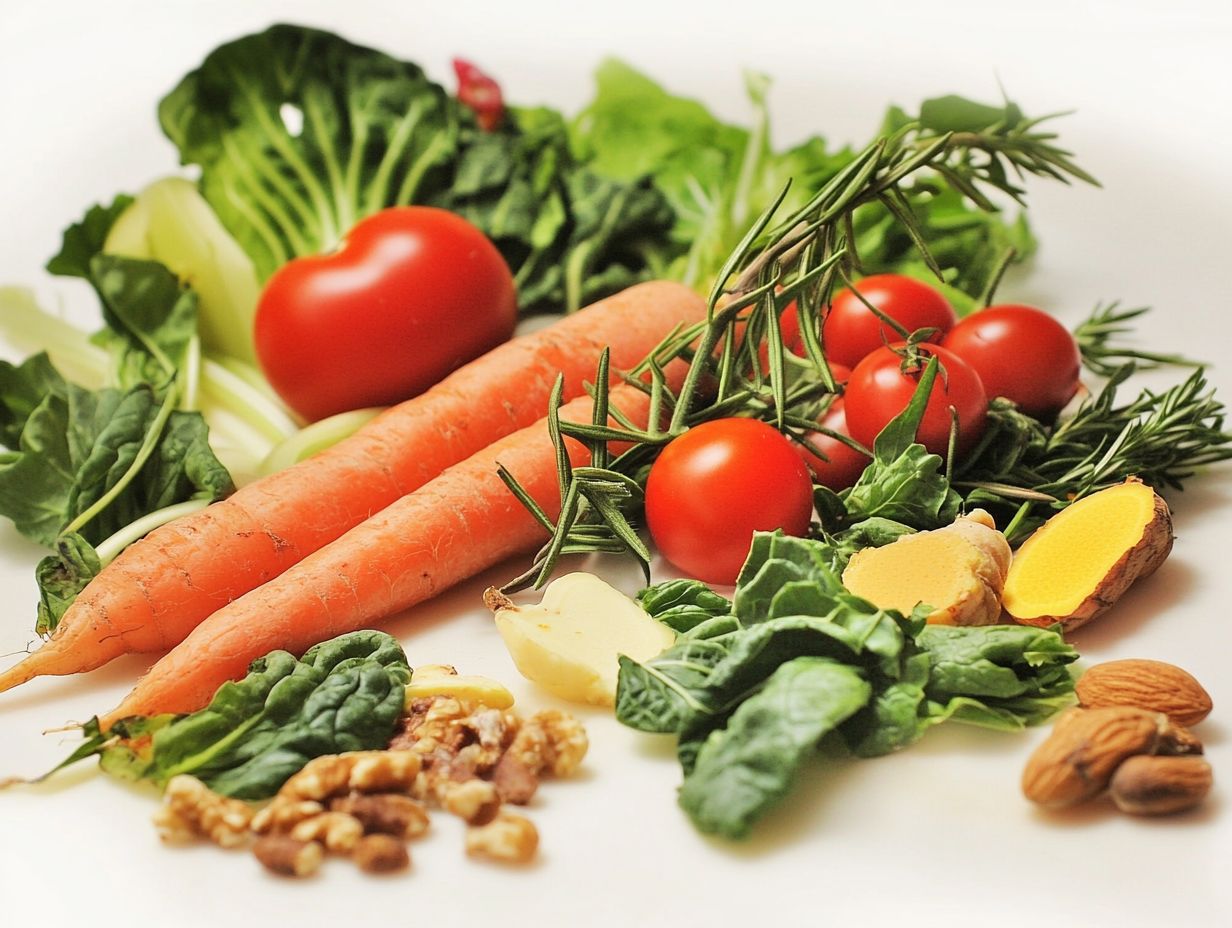
The best foods for reducing inflammation on a vegan diet are those that promote optimal health and well-being. Consuming a diverse range of nutrient-dense foods, including colorful fruits, vegetables, whole grains, legumes, nuts and seeds, as well as healthy fats, can significantly lower inflammation levels. Integrating these foods into daily meal plans can support inflammation reduction and overall health.
These foods are also rich in antioxidants and phytochemicals that further enhance the benefits of following a vegan diet.
1. Fruits
Fruits are a vital component of a vegan diet, offering a rich source of antioxidants and dietary fiber that can help reduce inflammation and promote overall health. They also provide essential nutrients that support gut health and disease prevention.
Berries, citrus fruits, and apples are particularly high in vitamins and other phytochemicals that combat oxidative stress in the body. Incorporating these fruits into daily meals can enhance nutritional intake and support an anti-inflammatory diet.
For instance, enjoying blueberries with oatmeal for breakfast or blending a spinach and banana-citrus smoothie are excellent ways to include anti-inflammatory fruits along with greens.
In the afternoon, apple slices paired with nut butter or a citrus salad with nuts make for convenient and healthy snacks.
These fruits not only aid in health management but also contribute flavor and texture to a diverse and nutrient-rich vegan diet.
2. Vegetables
Vegetables are a vital source of vitamins, minerals, and fiber in a healthy vegan diet and play a key role in overall nutrition. They help protect against inflammation and support the immune system. Including a variety of vegetables in meal plans can enhance nutrient intake and health benefits.
Leafy green vegetables, cruciferous vegetables, and brightly colored vegetables are particularly rich in micronutrients and phytochemicals that enhance immune responses. Incorporating a variety of vegetables into a plant-based diet can enrich flavors, colors, and textures.
For instance, kale and spinach are excellent sources of antioxidants, while broccoli and Brussels sprouts provide sulforaphane, an anti-inflammatory compound. Steaming or roasting these vegetables can help preserve their nutrients.
However, adding variety to one’s diet with different vegetables can be challenging. To encourage regular inclusion of vegetables in meals, one can chop a mix of them and store it in the refrigerator at the beginning of the week. This makes it easier to incorporate them into stir-fries, salads, or smoothies.
Simple dressings and spices can enhance these dishes and encourage more vegetable consumption.
3. Whole Grains
Whole grains serve as the primary source of fiber in a vegan diet and provide essential nutrients that help reduce inflammation and promote digestive health. They are integral to diverse vegan meal plans and can be incorporated into a variety of recipes.
Grains such as quinoa, brown rice, and oats enhance nutrient intake and assist in regulating blood sugar levels, which are vital components of the health benefits associated with whole grains. Additionally, farro, barley, and bulgur are excellent sources of whole grains that offer diverse nutrients and can introduce variety to meals.
All of these grains possess anti-inflammatory properties due to their rich content of antioxidants and phytonutrients. Incorporating them into daily meals is simple; for example, you can:
- Add cooked barley to vegetable soup,
- Mix quinoa into a salad,
- Enjoy overnight oats made with plant-based milk and fruit for breakfast.
These whole grains can enhance both flavor and nutrition in lunches and dinners as well.
4. Legumes
Legumes are an excellent source of plant-based proteins and fiber, making them one of the most important vegan foods for promoting health and reducing inflammation. These nutrient-rich foods should be a staple in vegan meal planning.
Foods such as lentils, chickpeas, and black beans provide essential nutrients necessary for muscle health and overall nutrition.
These everyday staples can enhance overall health and support weight loss, as they are very filling.
For those looking to lose weight, these nutrient-dense foods can help suppress hunger, allowing individuals to feel full longer without consuming excessive calories.
Additionally, legumes are rich in antioxidants and have anti-inflammatory properties that contribute to reducing inflammation in the body.
Hearty lentil soups, chickpea curry, and black bean tacos are just a few examples of meals that showcase both the flavor and versatility of legumes. For those seeking recipe development inspiration, resources like the “Fertility Foods Cookbook” and “Taco! Taco! Taco!” offer great ideas. Additionally, platforms like EatingWell provide cooking demonstrations and cooking tips to enhance culinary skills.
Cooking demonstrations, combined with culinary arts and food photography, can inspire people to experiment with these ingredients, illustrating how simple and adaptable they are and proving that they can easily fit into any kitchen.
5. Nuts and Seeds
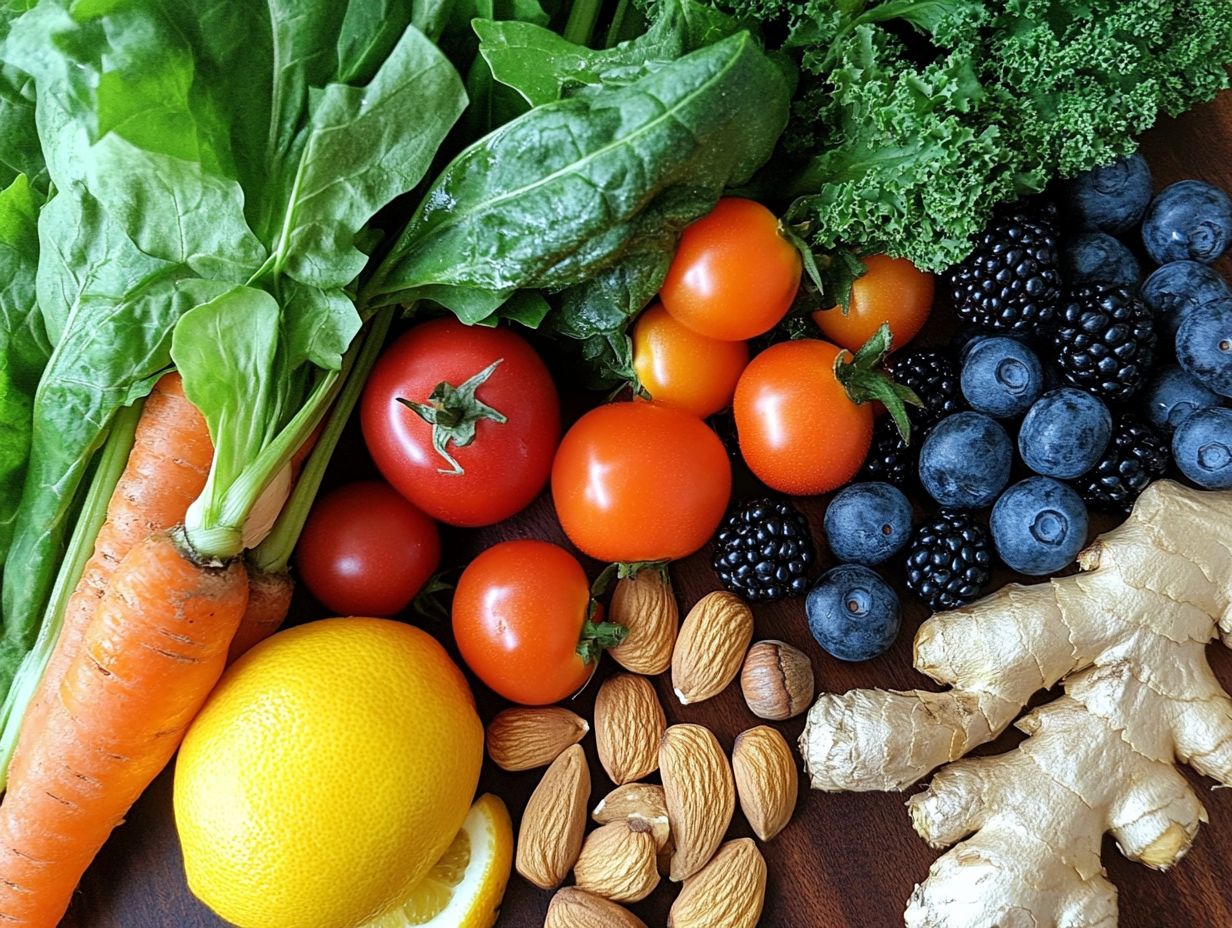
Nuts and seeds are excellent sources of healthy fats, plant-based proteins, and antioxidants, making them ideal for a vegan diet that supports effective inflammation management and overall health benefits.
Among these, walnuts, flaxseeds, and chia seeds are particularly rich in omega-3 fatty acids, which are known for their anti-inflammatory properties. Incorporating these nutrient-dense foods into daily meals can enhance overall health.
For instance, almonds and hazelnuts provide heart-healthy monounsaturated fats, while pumpkin seeds are abundant in magnesium, which is beneficial for muscle function and stress relief.
Utilizing a variety of nuts and seeds allows for versatility in meal preparation, such as adding chia seeds to smoothies or using a mix of nuts as a crunchy topping for salads.
Meal prep options like homemade granola, energy balls, or nut butter can facilitate enjoying their benefits on the go. Simple recipes, such as chia pudding or trail mix, make it easy to obtain essential nutrients while adding variety to a vegan diet.
6. Healthy Fats
A vegan diet should include healthy fats from sources such as avocados, olive oil, and flaxseed oil, as these provide omega-3 fatty acids and monounsaturated fats, which help reduce chronic inflammation and support heart health. These healthful fats are essential for maintaining a balanced and healthy lifestyle.
Fats are also essential for the absorption of fat-soluble vitamins A, D, E, and K, which are crucial for various bodily functions. Incorporating polyunsaturated and monounsaturated fats while minimizing trans fats found in processed foods can significantly enhance overall wellness and vitality. Additionally, dietary changes that emphasize healthy fats can contribute to heart disease prevention and diabetes management.
To incorporate these healthy fats into meal planning and preparation, consider using:
- Nuts and seeds as snacks
- Adding nut butters to smoothies
- Drizzling olive oil over salads
Thoughtful recipe development that utilizes these ingredients can create delicious, health-conscious meals that promote long-term well-being.
7. Herbs and Spices
Herbs and spices not only enhance the flavor of meals but also offer numerous health benefits, particularly their ability to reduce inflammation. Ingredients such as turmeric, ginger, and garlic are rich in antioxidants and phytochemicals, which are essential components of an anti-inflammatory diet. Incorporating these powerful ingredients into your diet is quite simple and can significantly aid in inflammation reduction and overall health improvement.
- Turmeric is the most common dietary source of curcumin, the key active component of turmeric. It can be easily added to smoothies, soups, or stir-fry dishes.
- Ginger is often grated into teas or used in marinades for meats and vegetables.
- Garlic, known for its immune-boosting properties, can be included in the brine for roasted dishes and dressings.
Other excellent options include cinnamon, which is delicious when added to oatmeal, and cayenne pepper, which adds heat to savory meals. Both of these spices also provide additional anti-inflammatory benefits.
What Foods Should Be Avoided on a Vegan Diet for Inflammation?
The most effective way to manage inflammation on a vegan diet is to avoid foods that can trigger inflammatory responses and adversely affect overall health. Understanding food triggers and making informed dietary choices are crucial for effective inflammation management.
For optimal health and inflammation management, it is important to limit or eliminate processed foods, refined grains, added sugars, and certain food intolerances from one’s diet.
1. Processed Foods
Processed foods are often high in unhealthy fats, sugars, and preservatives, making them a significant source of inflammation. For those following a vegan diet, it is advisable to limit or avoid processed snacks, sugary beverages, and meals containing artificial preservatives. Consulting a registered dietitian can help tailor vegan meal plans that prioritize whole, healthful ingredients and nutrient-dense foods.
Consuming these types of foods can lead to chronic diseases such as obesity, heart disease, and diabetes, which are exacerbated by the inflammatory responses triggered by the ingredients in processed foods. Instead, individuals can seek alternative food options that are more wholesome and satisfying.
Whole grains like quinoa or brown rice can replace refined grains, providing essential fiber, phytochemicals, and nutrients, while fresh whole fruits and vegetables add valuable antioxidants to vegan diets. Incorporating these nutrient-rich options can support gut health and overall wellness.
By preparing home-cooked meals with organic ingredients and natural spices, people can significantly reduce their intake of processed foods. Following meal prep tips and developing cooking skills can further enhance dietary education and promote healthier eating habits.
2. Refined Grains
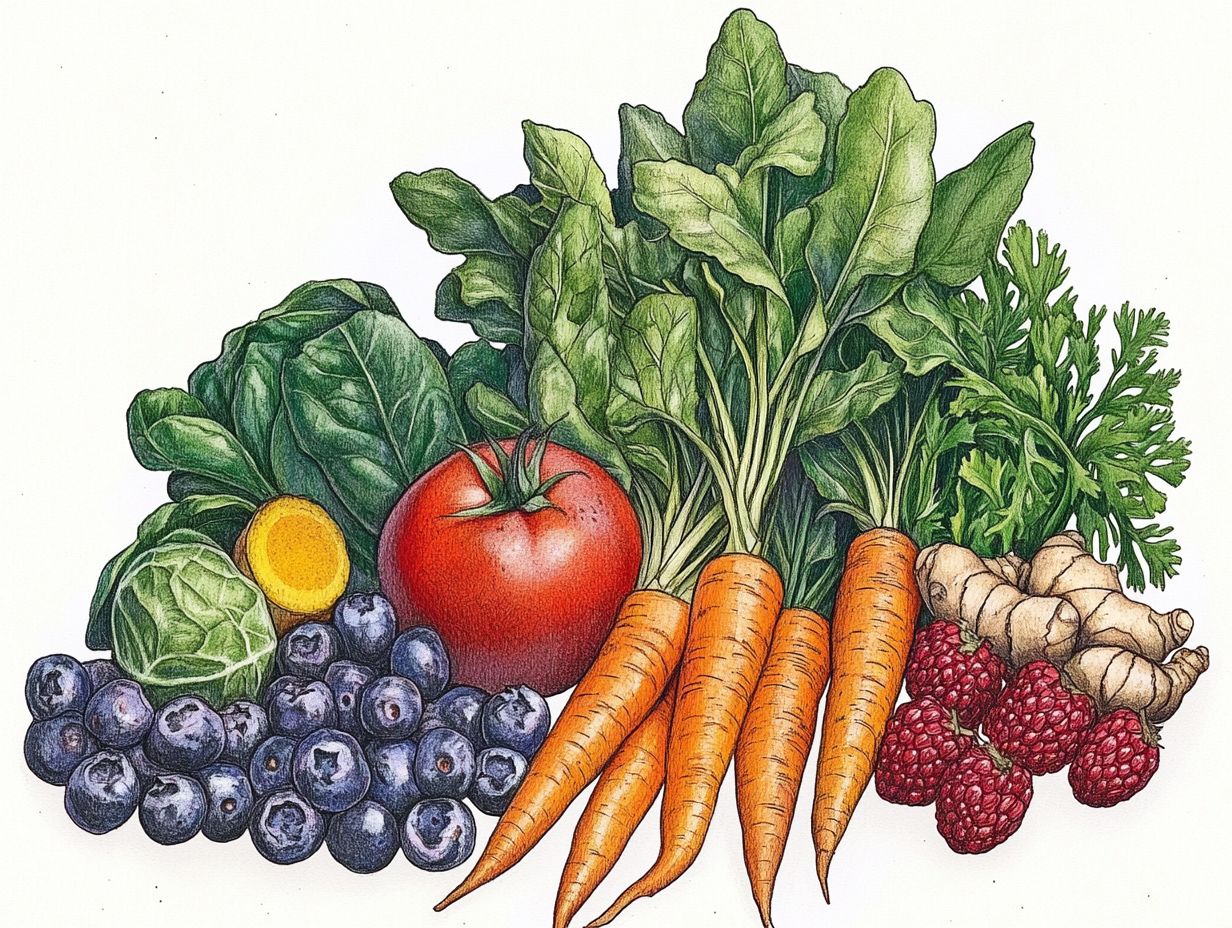
Refined grains are not beneficial for a vegan diet as they lack the essential nutrients and fiber that help reduce inflammation and are typically higher on the glycemic index. Examples of refined grains include:
- white bread
- white rice
- pasta made with refined flour
These foods can elevate blood sugar levels and trigger inflammatory processes. Elevated blood sugar can lead to increased insulin resistance and other chronic health issues, which is particularly concerning for those aiming to reduce inflammation. For effective management of chronic diseases like diabetes and rheumatoid arthritis, replacing refined grains with whole grains is crucial.
In contrast, whole grains such as quinoa, brown rice, farro, and whole oats are much healthier options. They are rich in vitamins, minerals, fiber, and antioxidants, helping to maintain stable blood sugar levels, promote gut health, and decrease overall inflammation.
3. Added Sugars
Added sugars are significant contributors to chronic inflammation and should be minimized in an anti-inflammatory vegan diet. Foods and beverages high in added sugars are associated with weight gain, diabetes, and the development of other chronic diseases, so those adopting a vegan lifestyle should prioritize naturally sweetened options.
Beyond their immediate health risks, added sugars can impair the body’s ability to regulate inflammation, which is linked to conditions such as heart disease and diabetes. This consideration is particularly important for individuals following a vegan lifestyle, as they should focus on choosing whole foods that are rich in fiber and nutrients. Emphasizing nutrient density and healthful snacks can make a significant difference in reducing chronic inflammation.
To identify and reduce added sugars, individuals can begin by carefully reading food labels and selecting products with little or no added sugars. Natural sweeteners like dates, maple syrup, or agave can be incorporated into the diet to satisfy cravings without the inflammatory effects associated with processed sugars. Meal planning and meal prep tips can further support these dietary changes.
4. Saturated and Trans Fats
Saturated and trans fats promote inflammation and should be avoided, even in a vegan diet. These unhealthy fats are primarily found in processed and fried foods, making it essential to include healthier fats, such as those found in nuts and avocados. Healthful fats are essential for overall well-being and can support various health conditions.
Increasing the intake of sources rich in monounsaturated and polyunsaturated fats can significantly benefit overall health. Foods rich in omega-3 fatty acids, like flaxseeds, chia seeds, and walnuts, are particularly important for reducing inflammation and maintaining heart health. These healthy choices can also aid in weight loss and improve gut health.
Using olive oil as the primary fat for cooking provides antioxidants that help protect against inflammatory processes. By emphasizing whole, plant-based foods, individuals can balance their health and well-being while ensuring their bodies receive all the necessary nutrients and eliminating unhealthy fat sources. Registered dietitians can provide valuable guidance for creating a balanced vegan meal plan that meets all nutritional needs.
5. Animal Products
Animal products, including meat and dairy, are generally linked to increased inflammation in the body and are therefore avoided in a vegan diet. Transitioning to a plant-based diet has been shown to significantly reduce markers of inflammation and improve various health outcomes. For those with specific dietary preferences or food intolerances, this shift can be particularly beneficial.
This shift also ensures a more balanced intake of nutrients, as plant-based diets emphasize whole foods such as fruits, vegetables, legumes, nuts, and seeds. These foods are rich in antioxidants, anti-inflammatory compounds, and fiber, which can help mitigate the effects of chronic inflammation and its associated risks.
Many individuals report increased energy levels, improved digestion, and better heart health after adopting a vegan lifestyle. By focusing on these nutrient-rich alternatives, anyone can experience not only a reduction in inflammation but also the creation of a healthier, more vibrant lifestyle. Consulting with nutrition experts like Sara Haas and Christa Brown, who contribute to resources like EatingWell, can further support this wellness journey.
How Can a Vegan Diet Help with Inflammation?
A vegan diet plays a crucial role in managing inflammation, as it consists of foods rich in antioxidants and anti-inflammatory compounds such as legumes, nuts, and a variety of fruits and vegetables.
Adopting a vegan anti-inflammatory diet not only helps reduce inflammation but also offers additional benefits, including enhanced heart health, weight loss, and better management of chronic conditions like diabetes and rheumatoid arthritis.
A vegan diet plays a crucial role in managing inflammation, as it consists of foods rich in antioxidants and anti-inflammatory compounds.
Adopting a vegan anti-inflammatory diet not only helps reduce inflammation but also offers additional benefits, including enhanced heart health and weight loss.
How to Incorporate a Vegan Diet for Inflammation into Your Lifestyle?
Here’s how you can utilize a vegan diet to help manage inflammation:
1. Follow dietary guidelines that emphasize whole grains, fruits, and vegetables.
2. Integrate plant-based proteins and healthy fats into your meals.
3. Develop meal plans that avoid common food triggers and include nutrient-dense foods.
4. Seek advice from registered dietitians to tailor meal plans that meet your nutritional needs and health goals.
5. Incorporate recipe development and cooking tips to make your diet both enjoyable and effective in reducing inflammation.
Here’s how you can utilize a vegan diet to help manage inflammation:
- Meal Planning: Start by creating a weekly vegan meal plan that includes a diverse array of nutrient-rich, whole plant-based foods, such as fruits, vegetables, whole grains, legumes, nuts, and seeds. This approach ensures you obtain a wide range of nutrients essential for overall health, inflammation reduction, and chronic inflammation management.
- Balanced Nutrient Intake: Pay close attention to your intake of plant-based proteins, healthy fats, fiber, omega-3 fatty acids, iron, vitamin B12, calcium, and vitamin D. Incorporate nutrient-dense sources like lentils, chickpeas, quinoa, chia seeds, flaxseeds, nuts, fortified plant-based milk, and nutritional yeast to meet your nutritional needs.
- Cooking Skills: Developing basic cooking skills will enable you to prepare meals from scratch and engage with culinary arts. This not only allows you to control the ingredients and portion sizes but also helps you avoid processed foods that may contain additives and preservatives that can exacerbate inflammation, which is crucial for inflammation management and reducing the risk of chronic diseases.
- Cooking Tips: Opt for healthy cooking methods such as steaming, baking, grilling, or sautéing with minimal oil. Experiment with anti-inflammatory herbs and spices like turmeric, ginger, garlic, and cinnamon to enhance the flavor and health benefits of your meals, which can support a healthy lifestyle and aid in weight loss.
- Meal Prep: To avoid unhealthy last-minute choices, prepare meals and snacks in advance using meal prep tips. Consider batch cooking soups, stews, or grain bowls, and portioning them for easy access. Keep pre-cut vegetables, fruits, and hummus ready for quick, healthful snacks, and nutritious snacks.
- Gluten-Free and Allergy Considerations: If you have gluten or other food intolerances or allergies, be sure to select gluten-free whole grains and be cautious about cross-contamination. Reading labels carefully is essential; alternatively, preparing meals from scratch allows you to have complete control over what goes into your food. For personalized advice and to address any specific dietary preferences, consult a registered dietitian or nutrition expert.
